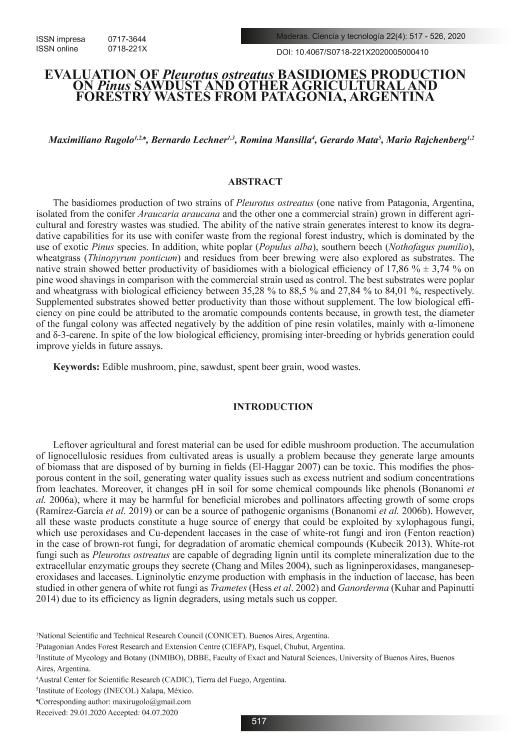Artículo
Evaluation of Pleurotus ostreatus basidiomes production on pinus sawdust and other agricultural and forestry wastes from patagonia, Argentina
Rugolo, Maximiliano ; Lechner, Bernardo Ernesto
; Lechner, Bernardo Ernesto ; Mansilla, Paula Romina
; Mansilla, Paula Romina ; Mata, Gerardo; Rajchenberg, Mario
; Mata, Gerardo; Rajchenberg, Mario
 ; Lechner, Bernardo Ernesto
; Lechner, Bernardo Ernesto ; Mansilla, Paula Romina
; Mansilla, Paula Romina ; Mata, Gerardo; Rajchenberg, Mario
; Mata, Gerardo; Rajchenberg, Mario
Fecha de publicación:
07/2020
Editorial:
Universidad del Bío-Bío
Revista:
Maderas. Ciencia y Tecnología
ISSN:
0717-3644
Idioma:
Inglés
Tipo de recurso:
Artículo publicado
Clasificación temática:
Resumen
The basidiomes production of two strains of Pleurotus ostreatus (one native from Patagonia, Argentina, isolated from the conifer Araucaria araucana and the other one a commercial strain) grown in different agricultural and forestry wastes was studied. The ability of the native strain generates interest to know its degradative capabilities for its use with conifer waste from the regional forest industry, which is dominated by the use of exotic Pinus species. In addition, white poplar (Populus alba), southern beech (Nothofagus pumilio), wheatgrass (Thinopyrum ponticum) and residues from beer brewing were also explored as substrates. The native strain showed better productivity of basidiomes with a biological efficiency of 17,86 % ± 3,74 % on pine wood shavings in comparison with the commercial strain used as control. The best substrates were poplarand wheatgrass with biological efficiency between 35,28 % to 88,5 % and 27,84 % to 84,01 %, respectively. Supplemented substrates showed better productivity than those without supplement. The low biological efficiency on pine could be attributed to the aromatic compounds contents because, in growth test, the diameter of the fungal colony was affected negatively by the addition of pine resin volatiles, mainly with α-limonene and δ-3-carene. In spite of the low biological efficiency, promising inter-breeding or hybrids generation could improve yields in future assays.
Palabras clave:
EDIBLE MUSHROOM
,
PINE
,
SAWDUST
,
SPENT BEER GRAIN
Archivos asociados
Licencia
Identificadores
Colecciones
Articulos(CADIC)
Articulos de CENTRO AUSTRAL DE INVESTIGACIONES CIENTIFICAS
Articulos de CENTRO AUSTRAL DE INVESTIGACIONES CIENTIFICAS
Articulos(INMIBO (EX - PROPLAME))
Articulos de INSTITUTO DE MICOLOGIA Y BOTANICA
Articulos de INSTITUTO DE MICOLOGIA Y BOTANICA
Citación
Rugolo, Maximiliano; Lechner, Bernardo Ernesto; Mansilla, Paula Romina; Mata, Gerardo; Rajchenberg, Mario; Evaluation of Pleurotus ostreatus basidiomes production on pinus sawdust and other agricultural and forestry wastes from patagonia, Argentina; Universidad del Bío-Bío; Maderas. Ciencia y Tecnología; 22; 4; 7-2020
Compartir



